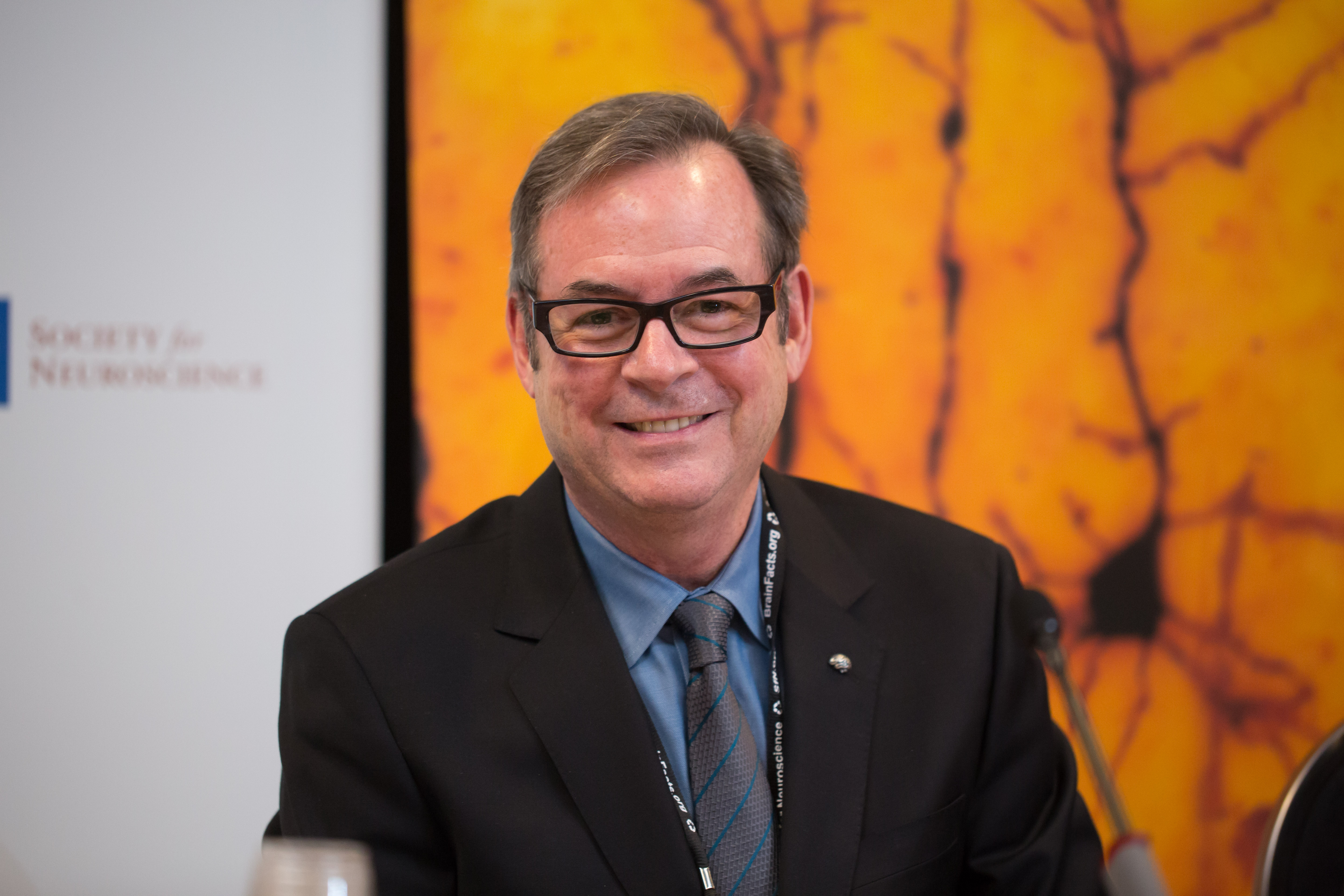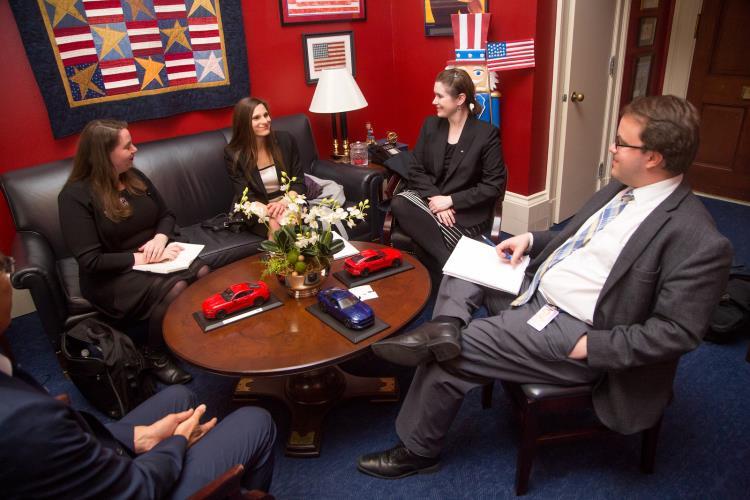
Neuroscience 2018: Inspiring Conversations Around Science
Innovation will be a cornerstone of SfN’s 48th annual meeting, with lectures exploring groundbreaking research, symposia debuting promising new science, workshops providing professional and career development, and the largest poster session in neuroscience and related fields supporting scientists of all backgrounds, disciplines, and expertise.
Approximately 30,000 neuroscientists, clinicians, and advocates are expected to attend Neuroscience 2018, November 3–7, at the San Diego Convention Center. The meeting delivers opportunities for attendees to learn about emerging research, present and receive feedback on their work, find potential collaborators, and advance their careers.
As a scientist, “You're always asking questions. You're always inquisitive. You're always looking for more information,” Thomas Obisesan, a research assistant at Howard University in Washington, D.C., said at last year’s annual meeting. “Being part of SfN and coming to these conferences, it really gives me the opportunity to embody that, to be a lifelong learner. And every year that I come … it's an experience that allows me to grow a little bit more in my knowledge and in my ability to ask those questions.”
Neuroscience 2018 attendees can interact with their colleagues in multiple ways, including by asking questions on the poster floor, participating in workshops, networking at social events, and more.
“In addition to comprising an exciting array of scientific sessions related to the most current trends we are seeing in the field, Neuroscience 2018 will help scientists to reconnect with why they love what they do and how they can consciously continue to grow in their careers,” said SfN 2018 Program Committee Chair Kang Shen.
Abstract Submissions: Increasing Transparency
This year, SfN’s Program Committee formed an Abstracts Rigor Working Group that examined ways to strengthen rigor and increase transparency in annual meeting presentations, including considerations in experimental design, data analysis, and reproducibility. Based on its recommendations, SfN has revised its abstract submission rules to set the expectation that presenters in scientific sessions report findings transparently.
The rules define scientific rigor and specify that scientists wishing to present must include a section in their abstract, to be expanded upon in their presentation, summarizing how they have demonstrated scientific rigor in the work described. In addition, the rules now state that “some aspect of the abstract must be original in the current SfN submission to reflect new progress,” which is defined as findings or possible significance that may be gathered from those findings.
Presidential Special Lectures
SfN President Richard Huganir selected plasticity and neuromodulation as the theme of this year’s Presidential Special Lecture series.
“All of the speakers have undertaken experimentally rigorous studies that use innovative technologies to investigate topics at the intersection of neuroscience, genetics, and human behavior — from glutamate receptors and synaptic proteins to epigenetic modification via genomic imprinting,” Huganir said.
This year's Presidential Special Lecture speakers are:
- Vivian Budnik, professor and chair of neurobiology at University of Massachusetts Medical School. Her lab uses a multidisciplinary approach including genetics, confocal and electron microscopy, electrophysiology, and molecular biology to identify proteins involved in scaffolding the synapse during assembly and regulating its function during plasticity. In “The dArc Matter of Synaptic Communication,” she will speak about mechanisms by which synaptic partners in the nervous system communicate as well as ones resembling those used by viruses during infection.
- Daniel Choquet, research director at the National Center for Scientific Research at the University of Bordeaux, France. His lecture, “From Nanoscale Dynamic Organization to Plasticity of Excitatory Synapses and Learning,” will discuss findings related to molecular mechanisms of learning as revealed through new tools such as super-resolution microscopy and single-molecule tracking.
- Catherine Dulac, Higgins Professor of Molecular and Cellular Biology at Harvard University and an investigator at Howard Hughes Medical Institute. Her lab is pursuing two lines of research: first, neuronal circuits underlying pheromone signaling, and second, genomic imprinting in the brain and the role of this major mode of epigenetic modification in brain development and function. Her lecture, “Neurobiology of Social Behavior Circuits,” will focus on parental care and the neural bases of maternal and paternal behaviors.
- Bryan L. Roth, Michael Hooker Distinguished Professor at the University of North Carolina School of Medicine. His lab researches the structure and function of G-protein coupled receptors, one of the most evolutionarily diverse superfamilies of the human genome, and synthetic neurobiology. His lecture, “From Salvia Divinorum to LSD: Toward a Molecular Understanding of Psychoactive Drug Actions,” will summarize how research has illuminated the molecular targets responsible for the actions of psychoactive drugs and discuss how that can be leveraged for therapeutic drug discovery.
Dialogues Between Neuroscience and Society Lecture
This year’s Dialogues Lecture will discuss the connections among music, emotion, memory, and creativity. A panel will feature American jazz guitarist and composer Pat Metheny; Charles Limb, Francis A. Sooy Professor of Otolaryngology at the University of California, San Francisco; and SfN President Richard Huganir. The Dialogues Lecture is an annual event that explores the ways in which neuroscience intersects with the world around us.
Promoting Progress Through Storytelling
Building on the positive reception of a session on storytelling in science at last year’s annual meeting, the session will again be held at Neuroscience 2018 and will focus on how scientists can use storytelling to better communicate and engage the public with their science.
The minisymposium, “Telling Stories of Science,” will be chaired by Wendy Suzuki, professor of neural science and psychology in the Center for Neural Science at New York University. Panelists from Columbia and Princeton universities, Massachusetts General Hospital, the Icahn School of Medicine at Mount Sinai, Story Collider, and Nature Neuroscience will pair instructional talks with three powerful personal stories.
Dual Perspectives Session
Neuroscience 2018 will feature a new session titled Dual Perspectives. This session will expand on topics previously reviewed in JNeurosci’s Dual Perspectives articles. During the session, two presenters will discuss their complementary viewpoints on a controversial topic related to developments in neuroscience, illuminating the potential of considering and constructively challenging others’ ideas for moving forward as a field.
Increased Clinical Offerings
SfN values the participation of clinicians and clinician-scientists in its annual meeting and is implementing changes to this year’s annual meeting program to provide more content for translation to clinical practice. The popular Basic-Translational-Clinical Roundtables will be expanded from three to four sessions and the Meet-the-Expert series from 12 to 14 sessions, including two Meet-the-Clinician-Expert sessions. A curated itinerary will also help attendees to stay apprised of science on the cusp of clinical application and to connect with experts in relevant areas.
Start Planning Your Annual Meeting Experience
This preview represents only a sampling of the scientific sessions and events planned for this year’s annual meeting. SfN’s annual meeting remains one of the most anticipated events in science, and the Society offers significant discounts on registration for members. Renew now to take advantage of lower prices, and sign up for e-alerts for updates about registration and housing for Neuroscience 2018. See you in San Diego!























